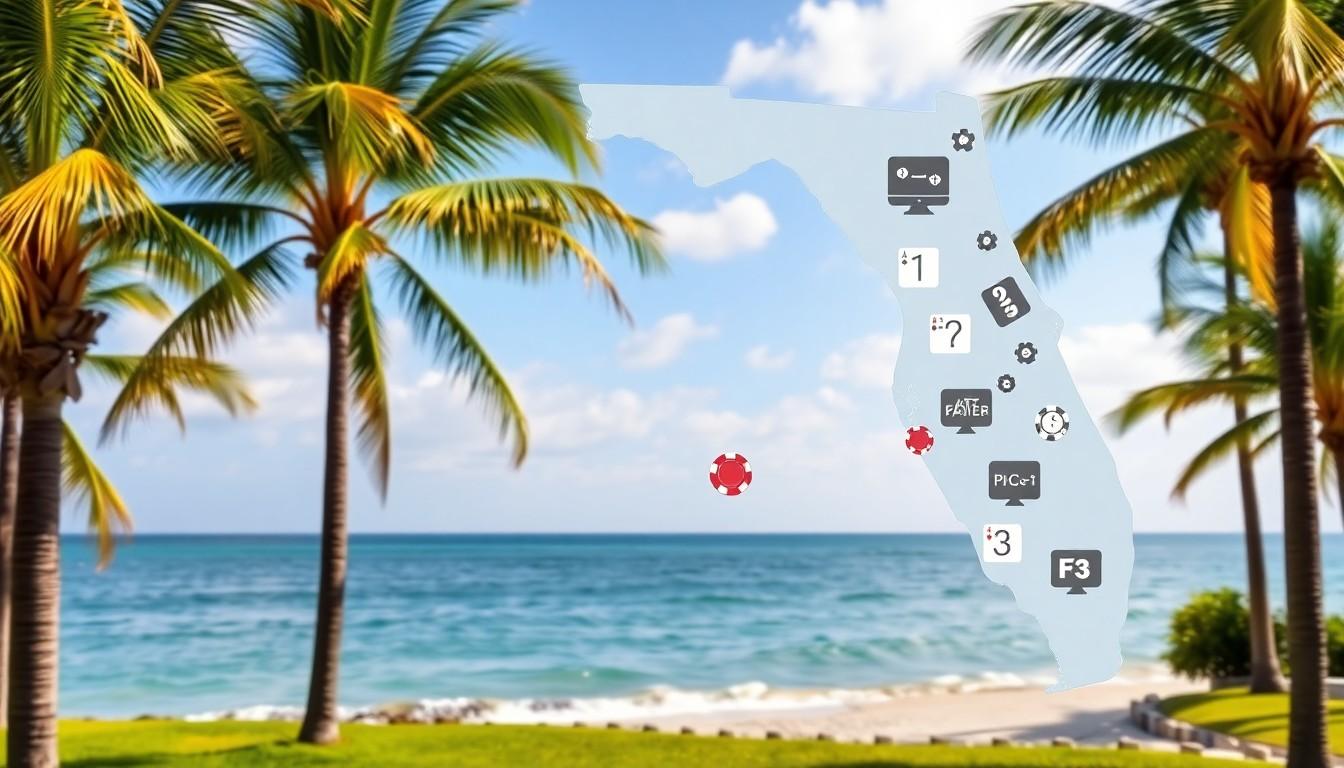Is Online Gambling Legal in Florida? Uncover the Truth About Betting in the Sunshine State

Florida, the land of sunshine and theme parks, has a reputation for being a playground for adults. But when it comes to online gambling, things can get a bit murky. With a mix of state laws and federal regulations, it’s easy for anyone to feel like they’re navigating a maze of legal jargon while trying to place a bet from their couch.
Is Online Gambling Legal in Florida
Online gambling in Florida remains a complex issue due to a mix of state and federal laws. State law does not completely legalize online gambling, creating confusion for residents and visitors. Federal regulations complicate this further, leaving those interested in online betting navigating a gray area.
Virtual poker rooms, online casinos, and sports betting sites often operate without clear legal standing. Many individuals explore various platforms, but their legality hinges on specific factors like the source of funds and the nature of the games. Some operators may claim compliance with local regulations, yet loopholes can complicate enforcement.
Legislative attempts to regulate online gambling have introduced various proposals. One proposal aimed at allowing regulated online poker games is the Internet Poker Freedom Act. This act seeks to clarify the legality of online poker, yet opposition remains strong.
State lawmakers occasionally consider options for legalizing online sports betting. Initiatives face challenges due to existing laws prohibiting gambling outside physical locations. Furthermore, any changes in law demand careful examination to ensure compliance with federal regulations.
Public opinion on online gambling reveals a growing interest among Floridians. Many individuals express support for more accessible betting options, although skepticism about potential impacts on societal issues remains. Overall, while momentum builds for potential changes in online gambling laws, significant hurdles remain before any uniform regulation can take effect.
Legal Framework in Florida

Florida’s legal framework regarding online gambling comprises a blend of state and federal laws. This mixture creates a complex environment for residents and visitors engaging in online betting activities.
State Laws Governing Gambling
State laws governing gambling in Florida feature a patchwork of regulations. The Florida Gaming Control Commission oversees legalized gambling forms, including some forms of online betting. Current statutes permit limited online gambling activities, primarily focusing on fantasy sports and intrastate poker rooms. Despite proposed legislation for broader online gaming options, significant regulatory hurdles remain. Operators must navigate licensing requirements and local laws, making it essential for participants to stay informed about specific regulations.
Federal Laws Impacting Florida
Federal laws impacting Florida’s online gambling landscape include the Wire Act and the Unlawful Internet Gambling Enforcement Act (UIGEA). The Wire Act prohibits interstate wagering on sports, while UIGEA restricts financial transactions tied to unlawful internet gaming. Recent legal interpretations have shifted, altering the application of these federal laws. Florida can regulate its online poker and casino operations, provided they align with federal guidelines. Operators must ensure compliance to avoid legal repercussions, underscoring the importance of understanding federal influences on state legislation.
Types of Online Gambling in Florida
Online gambling in Florida encompasses various activities. Each type has unique legal considerations and varying levels of accessibility.
Sports Betting
Sports betting allows users to place wagers on sporting events. Recent legal developments have increased interest in this market. Florida’s legislative landscape remains in flux, leading to ongoing discussions about sports betting legalization. Currently, mobile sports betting platforms operate with limited legal clarity. Residents often seek out these platforms, navigating uncertain regulations and compliance standards.
Casino Games
Casino games include popular options such as slots and table games. A select few operators provide online casino experiences within Florida’s gaming framework. State laws emphasize regulatory oversight, with the Florida Gaming Control Commission managing these activities. Despite the restrictions, many individuals engage with offshore casino sites, presenting potential legal risks. Clarity on these platforms remains crucial as state officials work towards broadening the legal landscape.
Poker Platforms
Poker platforms offer players a chance to compete against each other in games of skill. Florida permits a limited form of online poker through intrastate regulations. Several sites strive to comply with state laws, ensuring fairness and security for users. Legislative efforts to expand online poker usage face challenges from competing interests and regulatory concerns. Continued dialogue about the legality and regulation of poker platforms is vital among stakeholders and officials.
Current Status of Online Gambling Legislation
Online gambling in Florida operates within a challenging legal framework. State regulations, overseen by the Florida Gaming Control Commission, allow limited online gambling activities. Intrastate poker rooms and fantasy sports platforms represent the primary avenues for legal online betting. Despite this, legislation for expanded online options remains stalled due to complex regulatory constraints.
Recent federal laws further complicate Florida’s gambling landscape. The Wire Act prohibits interstate wagering on sports. UIGEA restricts financial transactions related to illegal internet gaming. Legal interpretations have evolved, allowing for state regulation of online poker and casino operations as long as they adhere to federal criteria.
Many legislative proposals aim to clarify online gambling’s legality. The Internet Poker Freedom Act seeks to address the challenges faced by poker enthusiasts but encounters significant resistance. Lawmakers are also exploring avenues for legalizing online sports betting, reflecting strong public demand. However, existing laws continue to obstruct this progress.
Each type of online gambling in Florida presents unique legal implications. Increased interest surrounds sports betting due to recent legal developments. Mobile sports betting, however, experiences restrictions due to unclear regulations. A small number of operators offer casino games, which include slots and table games, but many Floridians turn to offshore platforms, exposing themselves to potential legal risks.
While intrastate poker rooms enjoy legal status, proposals for broader access often meet obstacles. Momentum exists for changes in online gambling laws, yet significant hurdles persist before any comprehensive regulations are established. Balancing public interest with regulatory measures remains a critical challenge in Florida’s evolving online gambling environment.
Potential Future Changes
Legislation surrounding online gambling in Florida may undergo significant shifts in the coming years. Lawmakers are exploring various options to expand legalized online sports betting, driven by public demand. Strong interest among residents for more accessible betting opportunities reflects changing attitudes toward gambling in the state.
Proposals like the Internet Poker Freedom Act illustrate attempts to clarify online poker’s legal status. These legislative efforts continue to face challenges, including opposition from various interest groups concerned about the implications of expanded online gambling. Nonetheless, shifting public opinion may push lawmakers to reconsider these initiatives.
States across the U.S. are increasingly legalizing online gambling, creating a competitive atmosphere. Florida may feel compelled to adapt its regulatory framework to remain among the leading recreational destinations. The complexity of existing state and federal laws dictates the pace of this evolution.
Recent discussions involving stakeholders signal a potential movement toward more comprehensive regulations. Regulatory bodies may refine existing laws to accommodate newer gaming formats and technologies. Adapting to these changes requires a careful balance, addressing both consumer interest and responsible gaming practices.
Uncertain legal standing persists for some online platforms, especially those operating across state lines. Federal laws, such as the Wire Act, continue to pose challenges for interstate sports betting operations. Clarity in these regulations may ultimately influence the development of Florida’s online gambling services.
Ongoing dialogue among lawmakers, regulators, and the public will shape the future landscape for online gambling in Florida. Increased awareness of the potential benefits and risks associated with gambling may drive more informed decision-making. As discussions progress, the prospect of broadening Florida’s online gambling options remains a key area to watch.
Navigating the landscape of online gambling in Florida presents unique challenges for both residents and visitors. While there’s a growing demand for more accessible betting options the legal framework remains convoluted and uncertain. Ongoing legislative efforts reflect a desire for clarity and expansion but face significant obstacles.
As public interest continues to rise it’s crucial for stakeholders to engage in meaningful discussions that balance consumer needs with responsible gaming practices. The future of online gambling in Florida is likely to evolve as lawmakers respond to changing attitudes and the competitive pressures from other states. Keeping an eye on these developments will be essential for anyone looking to participate in online gambling in the Sunshine State.






